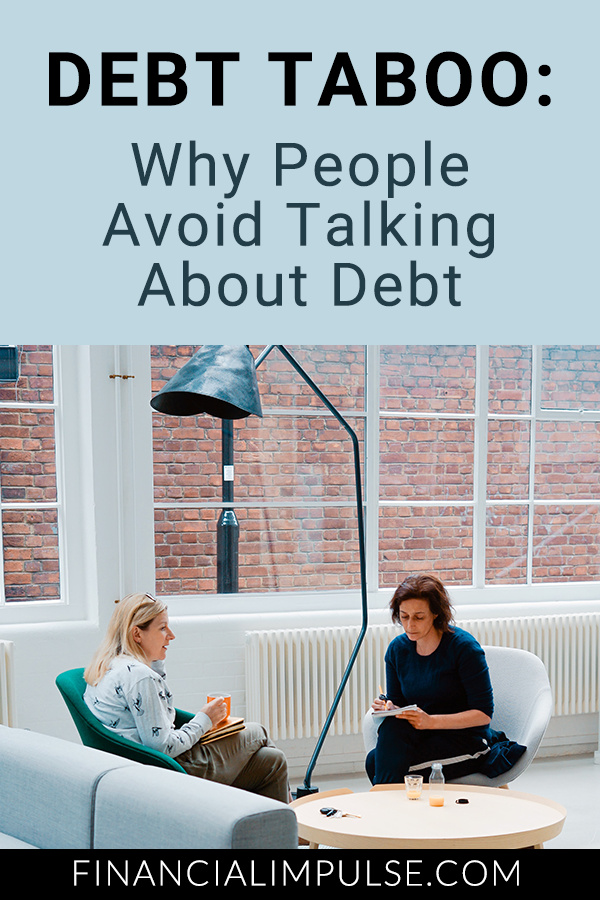Everyone knows they shouldn’t talk about money or debt in public. But why not?

Although the U.S. is among the richest countries in the world, many Americans lack emergency savings.
What’s more, Americans now owe more than $1.5 trillion in student debt, and in 2017, paid more than $34.3 billion in overdraft fees because they didn’t have enough money in accounts to cover their bills. Yet, it’s still taboo to talk about money and debt.
Needless to say, money is a sore subject.
In fact, a 2017 survey by Acorns found that most people would rather talk about their weight than their finances with their partners—the people we’re supposed to trust and open up to the most.
So why would we rather talk about almost everything else under than sun? What is it about money and debt that is so taboo to talk about?
Why We Don’t Talk About Debt
Shame about our financial circumstances stops us.
No one is perfect. Everyone makes mistakes.
We all know that, but we all find it difficult to admit that we have debt. Naturally, we feel ashamed to talk about things like if we’ve made a bad stock investment, or if we somehow overspent on a holiday.
In short, it’s hard to admit that we made financial mistakes to ourselves, much less to others. So what usually happens then?
We avoid conversations about money at all costs. But what we really should be doing is opening up—and having these difficult conversations to both prevent and identify what went wrong. Only once we’ve identified the root of the problem can we look at ways to fix it.
Even when debt isn’t the issue, we still tend to be ashamed to talk about money because it may reveal something that embarrasses us—for example, how much we spend on our pets or children, or how much we choose to spend on clothes.
We fear judgment.
Talking about financial hardship means that if we open up about our financial slips, people might judge us for our actions. Reactions and judgment can be especially harsh from those closest to us, perhaps because they want to see us succeed.
Quite simply, we don’t want to be judged for our financial decision-making, which is why we tend to avoid conversations like this at all costs.
So we avoid talking about debt—and this can even extend to dealing with the debt itself. Meaning that instead of getting out of debt, we do the opposite and get sucked into more. It becomes a cycle that never ends until you’re willing to do what seems to be the impossible: confront it head-on.
Money makes us nervous.
Helen Hathaway, author of Manners: American Etiquette, wrote, “We can discuss anything under the sun except money, disease, and personal affairs.”
Or, said differently: “The three things you never talk about are politics, religion, and money.”
Today, however, everyone is very happy to scream from the rooftops about their political beliefs or what religion they belong to. Moreover, many share absolutely everything on social media, making their personal affairs a public space.
Yet still, we rarely talk about money or debt.
The average American household owes an estimated $7,000 in credit card debt. What’s more, the average graduate owes more than $43,000. In spite of these facts, many continue to pretend that these figures don’t exist. Because it’s just not the “right thing” to talk about money.
What needs to happen?
Many bloggers are trying to change thoughts and conversation around money, especially when it comes to income and pay equity. Is it enough, though?
When we refuse to talk about money and debt, we’re simply feeding the idea that it’s a taboo subject, especially with our loved ones. What you’ll probably find, however, if you speak more openly about your finances, is that you’re not the only one with debt.
You’ll also find that you’re not the only one who’s not quite sure what to do. And, you may find that other people want to talk about it because they want to be assured that there are other people out there just like them.
Final Thoughts
It’s simply a matter of starting small. Talk to your partner or your family members about your concerns. Ask for their advice, if you’re willing to listen to it, or talk to them about whether they’ve ever been in the situation you’ve found yourself in. You’d be surprised at how many people around you have or are dealing with the same circumstances.
If you don’t want to talk about debt per se, perhaps you can turn the conversation into a “savings” conversation—getting tips and tricks on how to save so you can secure your financial future.
At the end of the day, our relationships with money need open dialogue in order to improve. Many people around us have some sort of debt, and being open about it will go a long way in removing the stigma from talking about debt.
About the Author
Luke Fitzpatrick has been published in Forbes, Yahoo! News and Influencive. He is also a guest lecturer at the University of Sydney, lecturing in the Pre-MBA Program and Cross-Cultural Management. You can connect with him on LinkedIn.





